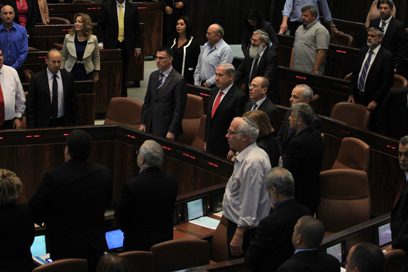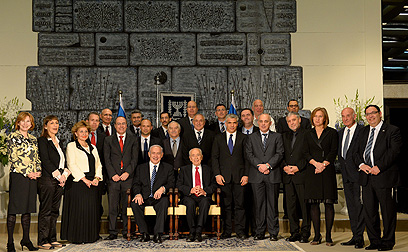
The full title of the proposal, slated for an expedited legislative procedure, is "Increase of Governance and Raising of the Electoral Threshold." According to senior Likud sources, the bill is drafted at the behest of Prime Minister Benjamin Netanyahu.
Related stories:
- Government to approve raising electoral threshold to 4%
- A new member of Knesset
- Draft Yaakov Perry Photo: Alex Kolomoisky Yaakov Perry Photo: Alex Kolomoisky Get Breaking News Alerts to Your Desktop Red email - send us news tips MKs spar over universal draft
The first clause in Rotem's bill purports to significantly complicate the passing of the motion of no confidence. "The people elected the government so it could rule, and we must enable it to do just that," the MK told Ynet regarding his bill.
Rotem added the prime minister and the government should not be subject to "extortion and endless parliamentary shenanigans."
As things stand, every Knesset faction can submit a proposal toward a vote of no confidence, a right various opposition parties choose to exercise on an almost weekly basis. This stands to be revoked in the new law, which will enter effect starting with the next Knesset.
Other clauses aimed toward increasing the power of the government state that in the event a vote of no confidence passes, and the appointed opposition leader fails to assemble a government, the previous government returns to its duties.
Also under the new bill, the president's stamp of approval shall no longer be a precondition for the dismissal of the Knesset.

'Draconian law.' Knesset plenum (Photo: Gil Yohanan)
In addition, the law proposal seeks to limit the number of cabinet ministers to 19 and double the electoral threshold to 4% of the general vote. This controversial motion is seen as targeting the smaller parties -- chiefly the Arab ones - which make up a significant proportion of the opposition.
Another clause potentially hurtful to the smaller political blocs is calling off the funding for the election campaigns of those parties which failed to pass the electoral threshold. The practical meaning of this is likely to the obliteration of many fringe parties unable to secure independent funding of their campaigns.

Members of 33rd cabinet with President Peres (Photo: Avi Ohayon, GPO)
Finally, the law proposes the reduction of the number of cabinet ministers to 19, including the prime minister, stipulating that the number of deputy ministers will not exceed four..
The law's architects state its aim as bolstering the stability of the government. "The current situation, when no confidence motions became a routine matter, though the opposition usually cannot designate a leader, is undesirable," read the proposal. "The purpose of (the bill) is to enable more effective governing and reduce incentives for excessive fragmentation and divisiveness in the political system."
Should the electoral threshold be raised to 4%, the 20th Knesset would look significantly different than the current one.
For example, neither of the two Arab parties – United Arab List-Ta'al, which won 3.65% of the votes cast in the general elections, or Balad, which won 2.56% – would have made it into the current Knesset. Also, the joint Arab-Jewish party Hadash (2.99%) would have failed to reach the threshold, and they would have been joined by Shaul Mofaz's Kadima faction.
"We are talking about a draconian law promoted by people who cannot live with a critical opposition," MK Ahmad Tibi (United Arab List-Ta'al) said. "The goal is to hurt our representation. If this law should pass it would prove that this new politics is all about muzzling us through enemies of democracy like (MK Avigdor) Lieberman, David Rotem and their 'brotherly friends' (a reference to Habayit Hayehudi leader Naftali Bennett).
"The small parties are not the ones causing instability; rather, the knights of the Right, the settlers, are draining the government," he added.
The proposal also garnered criticism from large parties who stand to benefit from the move. Opposition Chairwoman MK Shelly Yachimovich slammed the Yisrael Beiteinu bill, saying: "While he sits on the defendant's bench awaiting trail, Lieberman is busy legislating dictatorial laws, which though they might suit his party, do not sit well with the idea of a Jewish and democratic State."
"Yisrael Beiteinu and Yesh Atid are two parties devoid of any democratic traits. They are ruled by one man and contain no democratic mechanisms," the Labor chairwoman added.
Further down the left end of the political spectrum, Meretz Chairwoman Zahava Gal-On also didn’t mince words, saying: "Avigdor Lieberman offers Israel a system based on a 'strong leaders,' much like the one in place in the dictatorship (of) Vladimir Putin.
"For the sake of governability the prime minister's strength will increase at the expense of Knesset factions. The prime minister will hold too much power," Gal-On said.
Yesh Atid also commented on the bill. "Since its inception, Yesh Atid has spearheaded the issued of a fundamental reform of the system (of governance), so as to increase stability and governability.
"MK Ronen Hoffman has already begun working on the issue. The reformation of the system of governance is serious and wide reaching, but it cannot be undertaken in haste," the party said.
- Receive Ynetnews updates
directly to your desktop















